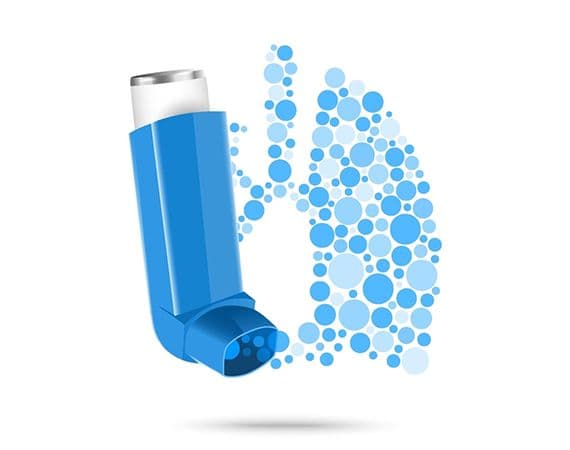
Asthma
What is asthma?
Asthma, or bronchial asthma, is a chronic lung condition that requires ongoing medical management as it does not resolve independently. According to the Global Asthma Report 2022, approximately 35 million people in India are affected, accounting for 13.09% of the global asthma burden. Alarmingly, India is responsible for over 42% of global asthma-related deaths. Asthma occurs when the airways become inflamed narrow, and produce excess mucus, leading to difficulty breathing, coughing, wheezing (a whistling sound during exhalation), and shortness of breath.
While asthma can be a minor inconvenience for some, it poses significant challenges for others, potentially disrupting daily life and even causing life-threatening attacks. Although asthma cannot be cured, its symptoms can be effectively managed with proper treatment. Since asthma symptoms may vary, working closely with a healthcare provider to monitor changes and adjust treatment plans as needed is crucial.
What is an asthma attack?
Under normal breathing conditions, the muscles around your airways remain relaxed, allowing air to move freely and quietly. However, during an asthma attack, three key changes occur that obstruct airflow:
1. Bronchospasm: The muscles surrounding the airways tighten, causing the airways to narrow and restricting airflow.
2. Inflammation: The airway lining swells, further reducing the air that can move in and out of the lungs.
3. Mucus Production: Excess mucus is produced during an attack, clogging the narrowed airways.
These changes make breathing difficult and often cause wheezing, a whistling sound heard when exhaling. An asthma attack, also called an exacerbation or flare-up, occurs when asthma symptoms are not well-controlled. Breathing can become increasingly difficult without prompt treatment, such as using a prescribed inhaler or bronchodilator.
It is critical to seek immediate medical attention in severe cases, as the absence of wheezing may mistakenly be perceived as an improvement. In reality, it indicates dangerously reduced airflow, requiring emergency care.
What are the causes of asthma?
The exact cause of asthma remains unclear, but a combination of genetic predisposition and environmental factors likely influences it. Different people have varying asthma triggers, leading to airway inflammation and breathing difficulties. Common asthma triggers include:
- Airborne allergens: Pollen, dust mites, mold spores, pet dander, and cockroach waste particles.
- Respiratory infections: Viruses like the common cold can provoke asthma symptoms.
- Physical activity: Exercise-induced asthma can cause airway narrowing during or after activity.
- Cold air: Exposure to cold temperatures can constrict airways and trigger symptoms.
- Air pollutants and irritants: Smoke, strong odours, and environmental pollutants may worsen asthma.
- Medications: Certain drugs, such as beta-blockers, aspirin, and nonsteroidal anti-inflammatory drugs (NSAIDs) like ibuprofen and naproxen sodium, can act as triggers.
- Strong emotions and stress: Intense emotional reactions and stress may lead to breathing difficulties.
- Food additives and preservatives: Sulphites found in shrimp, dried fruits, processed potatoes, beer, and wine can trigger asthma symptoms in some individuals.
- Gastroesophageal reflux disease (GERD): This condition, where stomach acids back up into the throat, can irritate the airways and worsen asthma symptoms.
Identifying and managing personal triggers is essential for controlling asthma and preventing flare-ups.
What are the symptoms of asthma?
Asthma symptoms can vary from person to person and may range from mild to severe. Common signs and symptoms include:
- Shortness of breath: Difficulty breathing, especially during physical activity or at night.
- Wheezing: A whistling or squeaky sound when exhaling, often a key sign of asthma.
- Coughing: Persistent or recurring cough, especially at night or early in the morning.
- Chest tightness: A feeling of pressure or tightness in the chest, making it uncomfortable to breathe.
- Increased mucus production: Excess mucus in the airways, leading to further blockage and discomfort.
Severe Symptoms (during an asthma attack):
- Extreme shortness of breath, making it hard to speak.
- Severe wheezing or the absence of wheezing due to blocked airways.
- Rapid breathing.
- Blue lips or fingernails (a sign of oxygen deficiency).
- Feeling anxious or panicked.
When to see a doctor
You should see a doctor for asthma if you experience the following:
Initial Diagnosis:
- If you have frequent coughing, wheezing, shortness of breath, or chest tightness.
- If your symptoms interfere with daily activities or disrupt sleep.
Worsening Symptoms:
- Increased frequency or severity of asthma attacks.
- If you're using your inhaler more often than usual.
- If symptoms are not improving with prescribed medication.
Emergency Situations (Seek immediate medical attention):
- Difficulty breathing or speaking due to breathlessness.
- Bluish lips or fingernails (a sign of low oxygen levels).
- Severe chest tightness or wheezing that doesn't improve with medication.
Follow-Up Care:
- If you have been diagnosed with asthma and need help managing your symptoms.
- If you're unsure about how to use your asthma medications properly.
- Regular check-ups are needed to monitor asthma control and adjust treatment if needed.
FAQS
Health In A Snap, Just One App.
KNOW MORE
